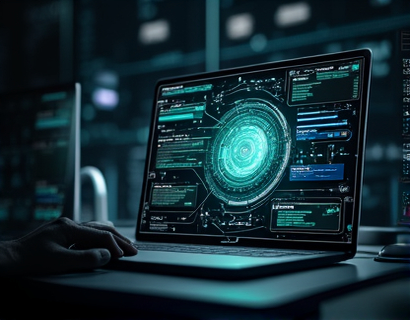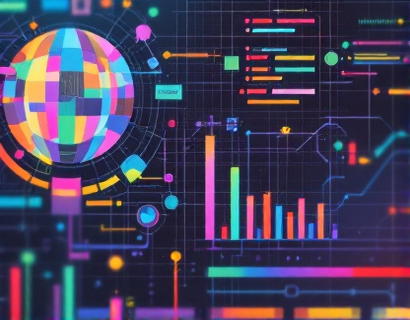Revolutionizing Digital Experiences: Harnessing the Power of Crypto and AI for Next-Gen Ucosystem Solutions
The digital landscape is undergoing a profound transformation, driven by the convergence of cryptocurrency and artificial intelligence (AI). This synergy is not just a technological curiosity but a powerful force reshaping how we interact with apps, services, and entire ecosystems. For tech-savvy individuals and businesses alike, understanding this convergence is crucial for staying ahead in the rapidly evolving tech landscape. This article delves into the ways crypto and AI are revolutionizing digital experiences, focusing on the development of next-generation app ecosystems that promise unprecedented growth and engagement.
The integration of cryptocurrency into digital ecosystems brings a new dimension of security, transparency, and decentralization. Traditional centralized systems often face challenges related to data breaches, user privacy, and trust issues. Cryptocurrency, with its blockchain foundation, offers a decentralized alternative that can mitigate these problems. By leveraging blockchain technology, app ecosystems can ensure that user data is securely stored and transactions are transparent and immutable. This not only enhances user trust but also opens up new possibilities for decentralized applications (dApps) that operate without intermediaries.
AI, on the other hand, brings intelligence, adaptability, and personalization to digital experiences. Machine learning algorithms can analyze vast amounts of data to provide insights, predict user behavior, and tailor experiences to individual preferences. When combined with the security and decentralization of crypto, AI can create highly responsive and secure app ecosystems. For instance, AI-driven recommendation engines can suggest content or services based on user interactions, while smart contracts can automate and enforce agreements between users and service providers without the need for central authorities.
The synergy between crypto and AI is particularly evident in the development of decentralized finance (DeFi) platforms. These platforms use AI to optimize trading strategies, manage risks, and enhance user experience. For example, AI algorithms can analyze market trends and automatically execute trades based on predefined criteria, all while ensuring that transactions are secure and transparent on the blockchain. This not only improves efficiency but also democratizes access to financial services, allowing users from around the world to participate in complex financial instruments.
Another area where crypto and AI are making waves is in identity verification and management. Traditional identity systems are often centralized and vulnerable to hacking and fraud. By using blockchain for identity storage and AI for verification processes, app ecosystems can offer robust and user-controlled identity solutions. Users can have full ownership of their identity data, sharing it selectively and securely with different services. This not only enhances privacy but also reduces the friction associated with multiple login credentials and verification steps.
The convergence of crypto and AI also extends to supply chain management and logistics. Blockchain provides a transparent and tamper-proof ledger for tracking goods from origin to destination, while AI can optimize routes, predict delays, and manage inventory in real-time. This combination ensures greater efficiency, reduces costs, and increases trust among all parties involved. For businesses, this means more reliable supply chains and better customer satisfaction, as they can provide real-time updates and assurances about the status of their orders.
In the realm of content creation and distribution, crypto and AI are transforming how creators monetize their work and how audiences discover and engage with content. Blockchain-based platforms can offer fair and transparent revenue sharing models, ensuring that creators receive a fair share of the profits. AI algorithms can curate personalized content feeds, recommending articles, videos, and other media based on user preferences and behavior. Smart contracts can automate royalty payments and content licensing, streamlining the process and reducing administrative overhead.
The healthcare sector is another area where the combination of crypto and AI is showing immense potential. Blockchain can secure patient data, ensuring privacy and compliance with regulations like GDPR. AI can analyze medical data to predict disease outbreaks, personalize treatment plans, and accelerate drug discovery. For instance, AI-powered diagnostic tools can analyze medical images and patient histories to provide early and accurate diagnoses, while blockchain can securely store and share this data among healthcare providers, enhancing collaboration and patient care.
For developers and businesses looking to leverage the power of crypto and AI, the opportunities are vast and varied. Building on decentralized platforms allows for greater innovation and flexibility, as developers can create dApps that operate independently of central authorities. The use of smart contracts ensures that agreements are automatically enforced, reducing the need for intermediaries and lowering transaction costs. Additionally, the transparency of blockchain provides a trustworthy environment for testing and deploying AI models, as all data and processes are visible and verifiable.
However, the integration of crypto and AI is not without challenges. One of the primary concerns is scalability. Blockchain networks, especially those using proof-of-work consensus mechanisms, can struggle with high transaction volumes and slow processing times. To address this, layer 2 solutions and more efficient consensus algorithms are being developed to enhance scalability without compromising security. On the AI side, ensuring the ethical use of data and algorithms is crucial to avoid biases and maintain user trust. Continuous research and development are necessary to create AI systems that are transparent, fair, and accountable.
Another challenge is the regulatory landscape. As crypto and AI technologies evolve, governments and regulatory bodies are beginning to take notice and implement rules to govern their use. Compliance with these regulations is essential for businesses operating in this space. This requires a deep understanding of both crypto and AI technologies, as well as the legal frameworks governing them. Staying informed and proactive in navigating these regulations can help businesses avoid legal pitfalls and capitalize on new opportunities.
Looking ahead, the future of digital experiences powered by crypto and AI is bright. As these technologies continue to mature, we can expect even more innovative applications across various industries. The convergence of these fields will likely lead to the creation of more intuitive, secure, and personalized digital ecosystems. For users, this means enhanced privacy, greater control over their data, and more seamless interactions with the digital world. For businesses, it presents opportunities to differentiate themselves, build stronger relationships with customers, and drive sustainable growth in a competitive market.
In conclusion, the integration of cryptocurrency and artificial intelligence is revolutionizing digital experiences, paving the way for next-generation app ecosystems. By leveraging the strengths of both technologies, we can create more secure, transparent, and user-centric digital environments. As tech-savvy individuals and businesses, embracing these advancements is key to staying relevant and thriving in the ever-evolving tech landscape.










































